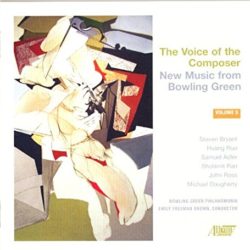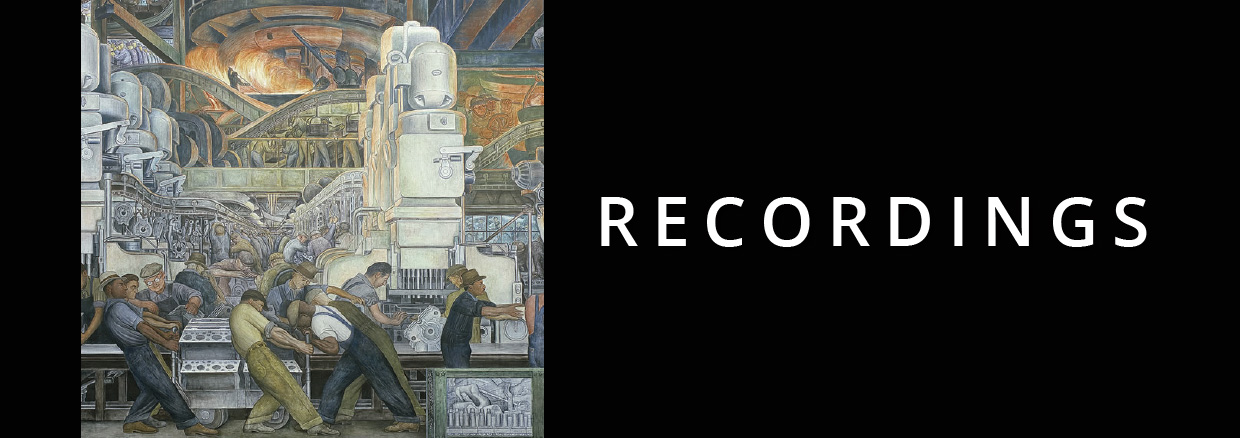The Voice of the Composer: New Music From Bowling Green
Albany Records/May 2008
Raise the Roof
Roger Schupp, timpani
Bowling Green Philharmonia
Emily Freeman Brown, conductor

REVIEW FROM FANFARE MAGAZINE:
This disc includes spoken introductions by the composers themselves to their respective pieces. Stephen Bryant refers to his work, Loose Id , as an “orgiastic, self-indulgent frenzy,” and the music does indeed live up to his promise. Bryant attempts to realize in sound the energy of Freud’s id. The piece, despite its premise, is tightly organised, and is given a gutsy performance by the Bowling Green Philharmonia. The use of wa-wa trumpets and drum kit is particularly relished. Recording quality is detailed, immediate, and clear.
Huang Ruo is a Chinese composer currently living in New York. His piece is an elegy for his grandmother, the text of which (in Chinese) is by Ruo himself. It is written for soprano or Chinese folk voice and orchestra. “Sao” in Chinese means sorrowful predicament. The title (only) is taken from a poem by Qu Yuan (fourth century B. C.). Huang Ruo himself “sings” the solo part (it is more of a falsetto croon), a meditation on life and death. This is a most involving piece whose compositional expertise far outstrips the novelty of Ruo’s voice. The scoring is often magical, with silvery percussion introducing the middle lament.
The German-born composer Samuel Adler was born in 1928, immigrating to the States in 1939. He has been taught by Piston, Randall Thompson, Hindemith, and Copland and has been remarkably prolific; his catalog includes five operas and six symphonies. Composed for the 70th anniversary of the League of Nations, his piece contrasts peace and war before ending with a coda of hope in the future and a fulfillment of Woodrow Wilson’s vision of peace. The title refers to the line, “I consider the agitation for international arbitration and world peace a deep-seated and permanent thing, representing the fixed and universal desire of the human heart.” A chorale, Verleih uns Frieden , underpins the first section before the more extrovert, angst-laden dissonant counterpoint of the middle section breaks out. The placatory return of the chorale in the work’s final moments is most effective. It is evident throughout that this is the music of a composer of much experience who has something of real import to say.
Unfortunately, there is too little space left on the disc between the end of the Adler and the beginning of Shulamit Ran’s spoken introduction to her piece. The Adler’s quiet ending has no time to resonate, so you may do well to have your remote control in your hand at this point. Ran, herself, won the 1991 Pulitzer Prize for Composition and received two Guggenheim Fellowships. She has lectured at the University of Chicago since 1973. Vessels of Courage and Hope (1998) was inspired by the story of the capture of the S.S. President Warfield by British forces while the ship was carrying over 4,000 Jewish Holocaust refugees to Palestine. Ran attempts to portray the emotions of the passengers in a work that runs to some 13 minutes. The harmonic language of the opening fanfares is powerful indeed, and presages the moments (more accurately, rays) of hope that are later to penetrate, however briefly, the musical surface. The final section is incredibly touching in its delicacy, a delicacy that is both of utterance and of expert orchestration.
John Ross teaches at Pittsburg State University. He takes a poem by Martin Bell, “After a Line by Theodore Roethke,” a succession of images without plot but dripping with allusion, “like an aroma that comes from an unknown and unseen source,” as Ross puts it in his introductory spiel. The language is almost Ravelian, often lush and fragrant, certainly intended to reflect the allusive nature of the poetry. The performance itself is handled with great sensitivity, and Jane Schoonmaker Rodgers sings unaffectedly.
– Colin Clarke
